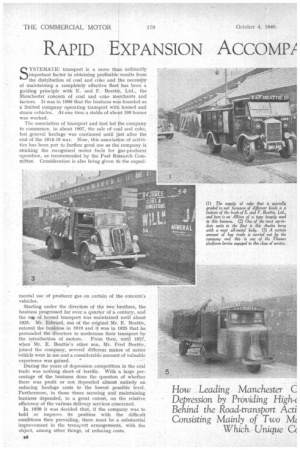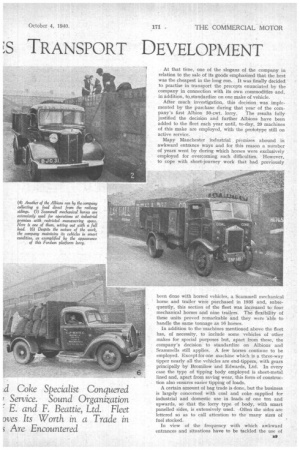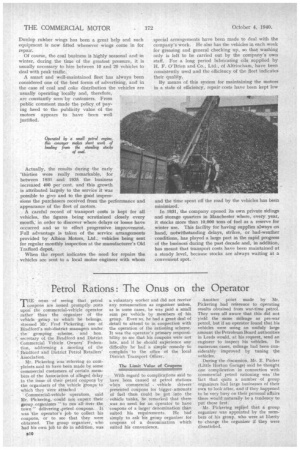RAPID EXPANSION ACCOMP/
Page 26

Page 27

Page 28

If you've noticed an error in this article please click here to report it so we can fix it.
s TRANSPORT DEVELOPMENT SYSTEMATIC transport is a more than ordinarily important factor in obtaining profitable results from the distribution of coal and coke and the necessity of maintaining a completely effective fleet has been a guiding principle with E. and F. Beattie, Ltd., the Manchester concern of coal and coke merchants and factors. It was in 1900 that the business was founded as a limited company operating transport with horsed and steam vehicles. At one time a stable of about 100 horses was worked.
The association of transport and fuel led the company to commence, in about 1907, the sale of coal and coke, but general haulage was continued until just after the end of the 1914-18 war. Now, this association of activities has been put to further good use as the company is stocking the recognized motor fuels for gas-producer operation, as recommended by the Fuel Research Committee. Consideration is also being given tO the experi mental use of producer gas on certain of the concern's vehicles.
Starting under the direction of the two brothers, the business progressed for over a quarter of a century, and the It. of horsed transport was maintained until about 1925. Mr. Edward, son of the original Mr. E. Beattie, entered the business in 1919 and it was in 1925 that he persuaded the directors to modernize their transport by the introduction of motors. From then, until 1927, when Mr. E. Beattie's other son, Mr. Fred Beattie, joined the company, several different makes of motor vehicle Were in use and a considerable amount of valuable experience was gained.
During the years of depression competition in the coal trade was nothing short of terrific. With a large percentage of the business done the question of whether there was profit or not depended almost entirely on reducing haulage costs to the lowest possible level. Furthermore, in those times securing and maintaining business depended, to a great extent, on the relative efficiency of the various delivery services concerned.
In 1930 it was decided that, if the company was to hold or improve its position with the difficult conditions then prevailing, there must be a substantial improvement in the transport arrangements, with the object, among other things, of reducing costs, At that time, one of the slogans of the company in relation to the sale of its goods emphasized that the best was the cheapest in the long run. It was finally decided to practise in transport the precepts enunciated by the company in connection with its own commodities and, in addition, to,standardize on one make of vehicle.
After much investigation, this decision was implemented by the purchase during that year of the corn pany's first Albion 50-cwt. lorry. The results fully justified the decision and further Albions have been added to the fleet each year until, to-day, 20 machines of this make are employed, with the prototype still on active service.
Many Manchester industrial premises abound in awkward entrance ways and for this reason a number of years went by during which horses were exclusively employed for overcoming such difficulties. However, to cope with short-journey work that had previously been done with horsed vehicles, a Scammell mechanical horse and trailer were purchased in 1935 and, subsequently, this section of the fleet was increased to four mechanical horses and nine trailers. The flexibility of these units proved remarkable and they were 'able to handle the same tonnage as 16 horses.
In addition to the machines mentioned above the fleet has, of necessity, to include some vehicles of other makes for special purposes but, apart from these, the company's decision to standardize on Albions and Scammells still applies. A few horses continue to be employed. Except for one machine which is a three-way tipper nearly all the vehicles are end-tippers, with gears principally by Bromilow and Edwards, Ltd. In every case the type of tipping body employed is sheet-metal lined and, apart from saving wear, this form of construction also ensures easier tipping of loads.
A certain amount of bag trade is done, but the business is largely concerned with coal and coke supplied for industrial and domestic use in loads of one ton and upwards, so that the lorry type of body, with smart panelled sides, is extensively used. .Often the sides are lettered so as to call attention to the many sizes of fuel stocked.
In view of the frequency with which awkward entrances and situations have to be tackled the use of e9 Dunlop rubber wings has been a great help and such equipment is now fitted whenever wings come in for repair.
Of course, the coal business is highly seasonal and in winter, during the tirae of the greatest pressure, it is usually necessary to hire between 10 and 20 vehicles to deal with peak traffic.
A smart and well-maintained fleet has always been considered one of the best forms of advertising, and in the case of coal and coke distribution the vehicles are usually operating locally and, therefore, are constantly seen by customers. From public comment made the policy of paying heed to the publicity value of the motors appears to have been well justified.
Actually, the results during the early 'thirties were really remarkable, for between 1931 and 1935 the business increased 400 per cent, and this growth is attributed largely to the service it was possible to give and to the good impressions the purchasers received from the performance and appearance of the fleet of motors.
A careful record of transport costs is kept for all vehicles, the figures being scrutinized closely every month, in order to discover where delays or losses have occurred and so to effect progressive improvement. Full advantage is taken of the service arrangements provided by Albion Motors, Ltd., vehicles being sent for regular monthly inspection at the manufacturer's Old Trafford depot.
• When the report indicates the need for repairs the vehicles are sent to a local motor engineer with whom special arrangements have been made to deal with the company's work. He also has the vehicles in each week for greasing and general checking up, so that washing only is left to be carried out by the company's own staff. For a long period lubricating oils supplied by H. F. O'Brien and Co., Ltd., of Altrincham, have been consistently used and the efficiency of the fleet indicates their quality.
By means of this system for maintaining the motors in a state of efficiency, repair costs have been kept low and the time spent off the road by the vehicles has been minimized.
In 19$1, the company opened its own private sidings and storage quarters in Manchester where, every year, it stocks more than 10,000 tons of fuel as a reserve for winter use. This facility for having supplies always on hand, notwithstanding delays, strikes, or bad-weather conditions, has played a large part in the rapid progress of the business during the past decade and, in addition, has meant that transport costs have been maintained at a steady level, because stocks are always waiting at a convenient spot.




















































